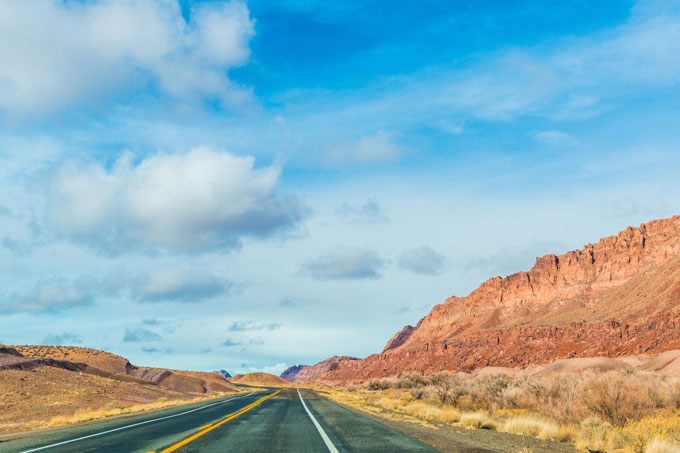Jim Butcher explores the legacy of Jack Kerouac’s iconic novel On The Road 60 years after publication.
Sixty years ago this September Jack Kerouac’s iconic novel On The Road was published. The spirit of Kerouac’s crazy travels back and forth across the USA, in search of ‘it’, influenced a newly mobile generation of students looking to the counterculture for inspiration.
The book, legend has it, was typed frantically on a single 120 foot manuscript (single sheets cut to size and taped together) over a three week coffee and benzedrine fuelled writing binge in 1951. Six years later, following edits and the changing of names to mask identities (partly due to the publisher’s fear of being sued), On The Road was published. Kerouac became ‘Sal Paradise’, Beat poet Allen Ginsberg (author of the iconic poem Howl) became ‘Carlo Marx’ and their crazy muse Neal Cassady became ‘Dean Moriarty’.
There are plenty of stories and legends surrounding the book and Kerouac’s life. One thing is certainly true – the jazz-like improvised stream of consciousness writing style he developed, and his search for meaning ‘on the road’ rather than in the American dream, resonated with the emerging vibe of the counterculture.
Kerouac inspired non-conformism, and the Beat’s influence was cited in moral panics around declining values on both sides of the Atlantic. FBI director J. Edgar Hoover said that beatniks, along with communists, were two of the greatest threats to American culture. Bob Dylan claimed Kerouac as a radical influence. One UK newspaper blamed the influence of Kerouac and the Beats on British youth for the 1961 ‘Beaulieu Jazz Riots’ – a set to about preferred styles of jazz, with beer and punches thrown. Kerouac was labelled the ‘Hobo prophet’, a ‘talented writer’ who ‘prefers to devote his talents to exalting the bums and jazz maniacs of the New York jazz cellars’. The paper pointed to British beatniks travelling abroad, especially to France, where ‘the atmosphere is somewhat more lax, and they can let themselves go’.
The Beat mode of travelling, in which an outer journey was a catalyst for inner enlightenment, influenced the Hippies. The Hippy Trail across Asia, undertaken mainly by relatively well healed students and musicians in search of spiritual inspiration, was an expression of the countercultural mood. In 1973 two adventurous travellers, Tony and Maureen Wheeler, out of cash on their travels, typed out and stapled together copies of Across Asia on the Cheap. It contained advice on quality marijuana and bribing Afghan border guards. Thirty four years later the Wheelers sold up seventy five per cent of their Lonely Planet empire for some sixty four million pounds.
Now, six decades on from On the Road, youth travel is heavily marketed as ethical gap years, adventure travel and ‘voluntourism’ to young people with time on their hands and the means and inclination to travel.
Whilst Kerouac and assorted Beats and Hippies dropped out of the mainstream in favour of an open ticket to nowhere in particular, today’s youth are encouraged to sign up to meaningful and character building experiences for their CVs. So what has happened to the spirit of travel?
Greater wealth, infrastructure and cheap flights are among the developments that make many far more mobile that in the past. But an opening up of geographical freedom seems to have been accompanied by a closure of a certain existential freedom associated with On The Road. Travel narratives today come with defined outcomes – global citizenship, CV building, portfolio developing. Young travellers are encouraged to reflect on their privilege and complicity in the problems of the world: to ‘tread lightly’ and to ‘give back’.
But there may be something to be said for reviving the spirit of freedom and experimentation associated with the Beats. For Kerouac, the world was an expanding realm of freedom within which to meet the word head on, unencumbered by the heavy moral baggage of others. Such footloose ambition is today challenged by the threat of terrorism, and also through well intentioned but ultimately conservative counsel to ‘check your privilege’ and avoid ‘cultural appropriation’. ‘Mass’ and ‘alternative’ tourists alike are subject to criticism that they damage cultural diversity and the environment, or that they are simply naïve if they believe that they can help others or change themselves.
By contrast, in Dharma Bums Kerouac writes ‘I saw that my life was a vast glowing empty page and I could do anything I wanted’ – not a bad motto for students who seek to make their mark in the world sixty years on from On The Road.
Jim Butcher is a Reader in the School of Human and Life Sciences, and the author of 3 books on the politics of leisure travel
He will be speaking in a debate on travel and Kerouac’s legacy at the Battle of Ideas on October.
 Expert comment
Expert comment Jeanette Earl
Jeanette Earl 2670
2670


